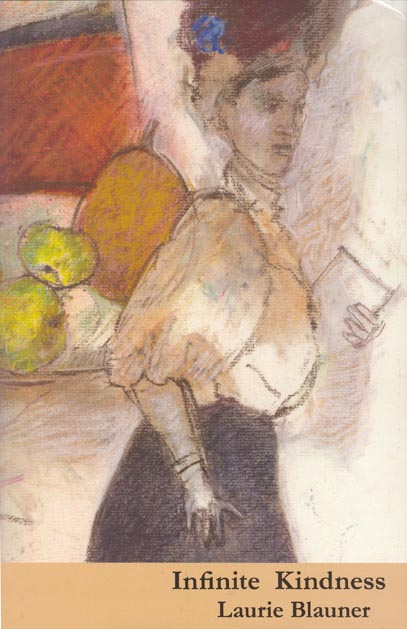|
|
Available from: or
|
|
Praise for Infinite Kindness |
|
"What a voice! Infinite
Kindness is a mesmerizing historical narrative which Laurie Blauner
invests with her considerable gifts as a poet. Like the best examples of the
genre, it is a novel for all times. Its subtle details transport us to a lost
era and yet its characters speak as if their uncertainties were our own. This
is a book that will stay in your heart for a good long while." -- Thomas Orton,
author of The Lost Glass Plates of Wilfred Eng |
|
"Set in
1867 London, Blaunerís atmospheric and intriguing second novel (after Somebody) centers on private nurse Ann
Russell, who is still haunted by her service in the Crimean War. Ann displays
the photo of a soldier whose suffering she relieved through euthanasia,
convincing others that she mourns for a fiancť and thus escaping entanglements
with men while she explores her sexual attraction to women. Other tensions
and uncertainties abound in this Victorian setting, in which sťances held to
communicate with spirits seem no odder than scientific experiments with such
unseen forces as electricity and magnetism. Annís graphic descriptions of
filthy hospital conditions and horrific injuries help justify her acts of
'mercy,' which result in the deaths of others in her care. Because she takes
laudanum while ministering to patients, many of her accounts have a surreal
quality. Her estrangement from her family, compulsive correspondence with
Florence Nightingale, and hints of past breakdowns raise additional questions
about her mental stability. Yet Annís personal struggles and the societal
upheavals and debates of the day offer much to ponder. The book may
disappoint fans of plot-driven historical sagas, but readers from public and
academic libraries willing to accept a poetic and evocative treatment of a
fascinating time will appreciate it." -- Kathy Piehl, Minnesota State University (Mankato), from a review
in Library Journal |
|
"... a moody exploration of power, rage and desire. Infinite
Kindness is uncomfortable and haunting..." -- Barbara Lloyd McMichael, from a review in the Kitsap Sun
(Bremerton, Washington) |
|
"...timeless
concerns and questions set in Victorian England in a very compelling
novel." -- Alan Caruba in Bookviews
(www.bookviews.com) |
Excerpt from the novel Infinite Kindness
At the Thompson House, London,
1867
After I killed him he rose up in my dreams again and again. My first time. For the first one. But not after that.
His face loomed, cloudy, indistinct, Martin. I still remembered his wide nose, the terse lips in my dreams. He floated over a straw mattress. Nearby I held a knife high, bringing it down gently upon another boyís sternum, the surgeonís job. In my dreams the blood that was released arced in the air, a thin red waterfall that never seemed to end. I awoke to Martinís white body, enclosed in a uniform, the hovering face.
Once it had not been a dream.
His name was Martin Farland. The first thing he said to me was, "please, kill me." I nodded, ignoring him. Some men groaned in the background. My nurseís cap was tipped to the side; the day was already long. I probably sighed because he repeated himself, "Please, kill me." The first one. He was watching the boy next to him, blood pooling at his ribs, a dirty, red shirt, an amputation of the arm. The way Martin clutched his stomach, I thought: cholera or dysentery. That faraway look in his eyes. The terrible smell all around us, blood and sewers and everything else the body offered. A strip of light from the sealed, frosty window alighted upon his cheek, a bandage. I knew he did not have long, this body that haunted my dreams. I barely saw him, one face among so many. "I do not have anyone," his plea was frozen in the air between us. I nodded. Why not? Men I did not know were dying by the minute. My cap slipped off my head, disappeared among the straw mattresses, the barely visible floor, the dying men. I felt that fabric of sunlight upon my back, warming my spine. I took the photograph he offered me, slipping it into my pocket. "I do not have anybody else," he said. "Thank you." That was how I remembered it. My first one.
Copyright © 2006 Laurie
Blauner, all rights reserved. Unauthorized reproduction by any means strictly
prohibited.
